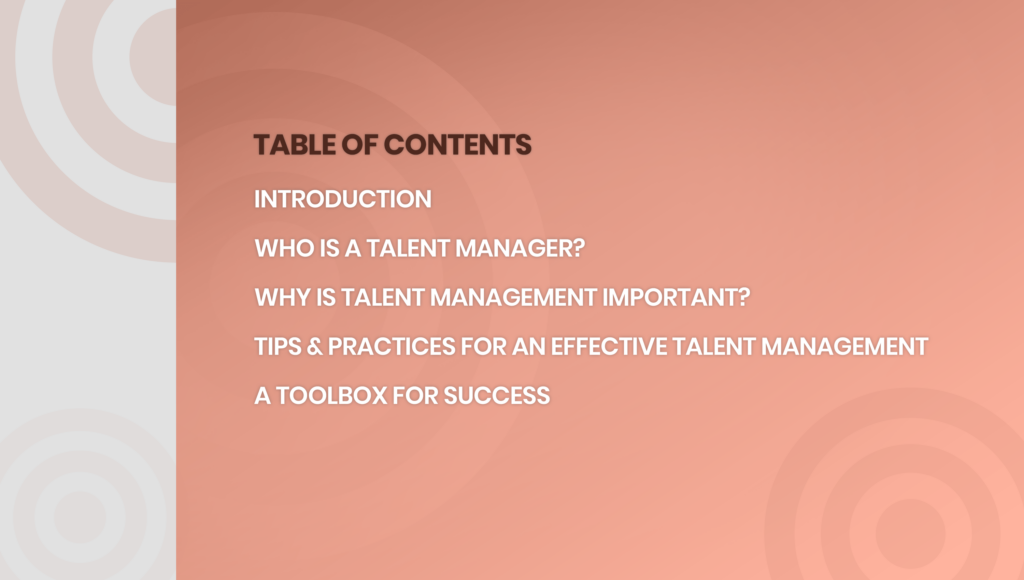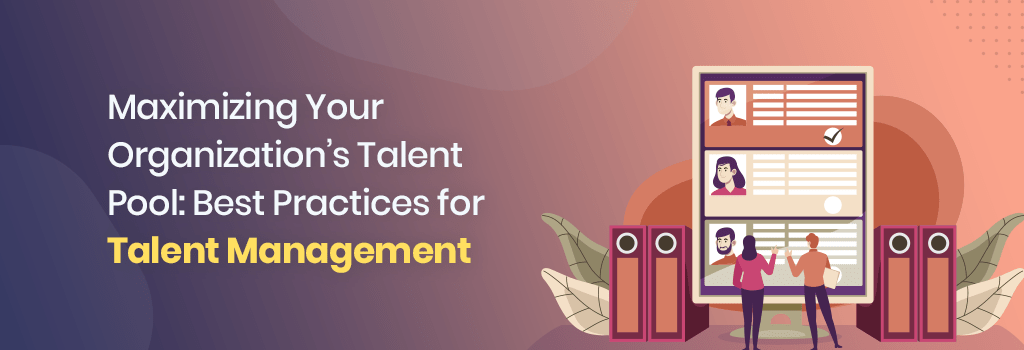Navigating the intricacies of triumphing in the corporate world, a fundamental inquiry emerges: What drives successful talent management? In a swiftly changing business terrain, unraveling the secrets of unlocking human potential takes center stage.

INTRODUCTION
In the maze of organizational success, a profound question echoes: What lies at the heart of effective talent management?
As the modern business landscape evolves at a breathtaking pace, the enigma of harnessing human potential becomes a quest of paramount importance.
Join us as we embark on a mission where you are going to navigate through the uncharted waters of talent management and discover the keys in unearthing the best practices that elevate human capital into an invaluable asset within your workforce.
WHO IS A TALENT MANAGER?
In the intricate dance of human resources, a talent manager is the orchestrator of an organization’s success. A Talent Manager is a strategic navigator, a mastermind who understands that an organization’s true strength lies in the collective potential of its people.
Picture a maestro conducting a symphony, each section of instruments playing in harmony to create a masterpiece. Similarly, a Talent Manager conducts the symphony of skills, experiences, and aspirations within a workforce.
As a guide and mentor, a talent manager shapes the narrative of human capital, ensuring that each note contributes to a harmonious and thriving composition. They are adept at spotting the perfect talent and nurturing them, ensuring a harmonious blend of individual brilliance and collaborative prowess where each note contributes to the organization’s melodious journey towards excellence.
WHY IS TALENT MANAGEMENT IMPORTANT?
Imagine a puzzle, each piece representing a unique skill set, experience, and perspective. The skillful arrangement of these pieces transforms chaos into a masterpiece. Similarly, talent management aligns individual aspirations with organizational goals, creating a synergy that propels the entire entity forward.
In today’s global marketplace, where competition for top talent is fierce, organizations must recognize that talent management is not just an HR function; it’s a strategic imperative.
Let’s explore the profound impact of this discipline and uncover the compelling reasons why optimizing your organization’s talent pool is a necessity: –
1. Strategic Alignment
Talent management ensures that your workforce is aligned with your organization’s strategic goals and objectives. It helps in identifying and developing the right talent that can drive your company’s mission forward.
2. Competitive Advantage
A robust talent management strategy gives you a competitive edge by enabling you to attract, retain, and develop top-tier employees where these individuals become a source of innovation, differentiation, and sustained growth.
3. Employee Engagement
Effective talent management fosters higher levels of employee engagement and satisfaction. When your employees feel valued and see opportunities for growth within the organization, they are more likely to be committed and motivated.
4. Skill Development
Investing in talent development enhances the skills and capabilities of your workforce, which not only improves overall productivity but also ensures that your employees are equipped to meet evolving challenges.
5. Employee Retention
Providing growth opportunities and a clear career path through talent management, saves recruitment costs and preserves institutional knowledge.
6. Long-Term Sustainability
Effective talent management contributes to the long-term sustainability of your organization. It ensures a steady flow of capable individuals who can contribute to the company’s success over time.
TIPS & PRACTICES FOR AN EFFECTIVE TALENT MANAGEMENT
As organizations strive to stay competitive and agile, the role of talent management has evolved from mere recruitment and retention to a strategic imperative that drives growth and innovation. Maximizing your organization’s talent pool requires a comprehensive understanding of the best practices and strategies that lays a strong foundation for successful talent management.
Welcome to a voyage into the realm of “Tips & Practices for an Effective Talent Management – Let’s delve deep into the core principles, proven strategies, and actionable tips that empower you to harness the full potential of your workforce and guide you to navigate you through the intricate terrain of talent management.
1. Build and Promote a Strong Employer Brand
A compelling employer brand not only attracts top talent but also cultivates a sense of pride and loyalty among existing employees. By showcasing your organization’s unique values, culture, and opportunities, you create a magnet for exceptional candidates.
2. Go After the Best Candidates Strategically
Identifying the right candidates requires a targeted approach. When you focus on quality over quantity, it ensures that your recruitment efforts are directed toward individuals who align with your organization’s vision and objectives.
3. Leverage AI in Recruitment
Embrace the power of AI Powered Workforce Management Platform to streamline, enhance your recruitment processes, analyze vast amounts of data, identify patterns, and help you make more informed hiring decisions.
4. Prioritize Succession Planning
The continuity and growth of your organization depend on a strong pipeline of future leaders. Succession planning ensures that the right individuals are ready to step into key roles, reducing disruptions and maintaining momentum.
5. Establish Employee Mentoring Initiatives
Mentoring programs foster a culture of learning and development. Pairing experienced employees with newer ones promotes knowledge transfer, skill enhancement, and a sense of camaraderie.
6. Encourage a Culture of High Performance
Cultivating a high-performance culture motivates your employees to consistently excel. Clearly defined goals, regular feedback, and recognition for achievements drive individuals to give their best.
7. Design an Empathetic Employee Exit Strategy
How you handle departures speaks volumes for your organization. An empathetic exit strategy ensures that departing your employees leaves on a positive note, preserving relationships and potentially leaving the door open for future collaborations.
8. Focus on Objective Data
Data-driven decisions are the bedrock of effective talent management. Rely on quantifiable metrics to assess performance, identify skill gaps, and make informed choices that drive growth.
A TOOLBOX FOR SUCCESS
Optimize, unlock, maximize your organization’s talent pool.
Embrace your toolbox and chart a course toward an organization where success knows no bounds. You have assembled a formidable toolkit that propels your organization forward.
Just as an artisan selects the finest tools to craft a masterpiece, you now possess the knowledge to select and wield the right practices to sculpt a thriving talent ecosystem. Remember, the effectiveness of any tool lies not just in its design, but in how skillfully it’s employed.
Your journey to maximizing your organization’s talent pool has just begun, and with the right tools at your side, the future is as boundless as your aspirations.

